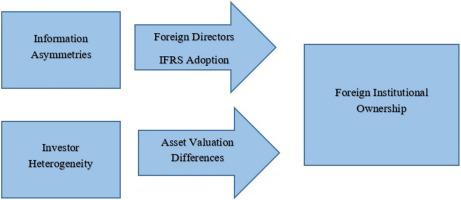Research in International Business and Finance ( IF 6.3 ) Pub Date : 2021-01-06 , DOI: 10.1016/j.ribaf.2021.101381 Yilmaz Yildiz

|
This study investigates the effects of information asymmetries and asset valuation model differences (investor heterogeneity) between foreign and domestic investors on their distinct portfolio holdings in an emerging market setting. I argue that information asymmetry and investor heterogeneity views significantly interact in explaining the different asset allocation decisions of foreign and domestic investors. Employing a large dataset from Turkey, the findings suggest that both information asymmetry and investor heterogeneity view play a key role in explaining the investment decisions of different investor groups. Specifically, different from domestic investors, foreign investors are more likely to invest in firms with a higher global market performance which supports the investor heterogeneity view. However, this relationship only holds for firms with high information asymmetries. The difference in valuation models between foreign and domestic investors converge when asymmetric information problems between these investor groups weaken. This study contributes to the international finance literature by providing a new explanation of why foreign and domestic investors invest in different assets.
中文翻译:

外国机构投资者,信息不对称和新兴市场资产评估
这项研究调查了新兴市场环境中外国和国内投资者之间信息不对称和资产评估模型差异(投资者异质性)对他们独特的投资组合持有的影响。我认为信息不对称和投资者异质性观点在解释外国和国内投资者不同的资产配置决策方面有很大的相互作用。研究结果使用来自土耳其的大型数据集,表明信息不对称性和投资者异质性观点在解释不同投资者群体的投资决策中都起着关键作用。具体而言,与国内投资者不同,外国投资者更有可能投资具有更高全球市场表现的公司,这支持了投资者的异质性观点。然而,这种关系仅适用于信息不对称程度高的公司。当这些投资者群体之间的信息不对称问题减弱时,国内外投资者的估值模型差异会趋于一致。这项研究为国际和国内投资者为何投资不同资产提供了新的解释,从而为国际金融文献做出了贡献。











































 京公网安备 11010802027423号
京公网安备 11010802027423号